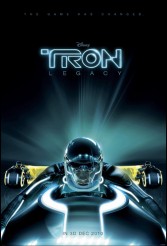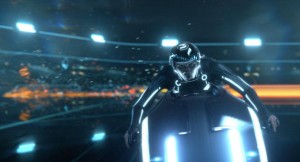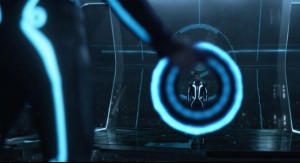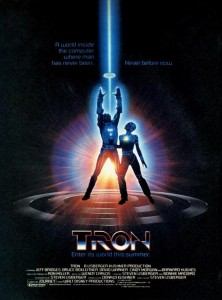It’s rare for a film to spawn a sequel (with some of the main cast) 28 years after the release of the original, but TRON has managed that feat and exceeded all expectations.
The original TRON, co-written and directed by Steven Lisberger was a ground-breaking film that took computer programmer Kevin Flynn (Jeff Bridges) inside a computer where he fought against nefarious programs inside the “grid.”
It was unlike anything out there, but its concept was perhaps way ahead of its time, which is why the film wasn’t the mega-success it should have been.
Now, audiences are ready and totally plugged in to the computer universe, which makes TRON: LEGACY (arriving in theaters in 3-D on December 17) primed to be even more successful than its predecessor. This time, Flynn has disappeared and his now grown-up son Sam (Garrett Hedlund) ends up in the grid his father created and has to fight against a 35-year old computer program version of his father called Clu.
Lisberger served as producer and guru on the film to newbie director Joe Kosinski and screenwriters (and former LOST scribes) Adam Horowitz and Edward Kitsis. In this exclusive interview, Lisberger spoke with ASSIGNMENT X about this brave new computer world and how he reveled in having a new generation play in his sandbox.
ASSIGNMENT X: Is it weird to see how far TRON has come since 1982?
STEVEN LISBERGER: We bought frisbees on the first TRON – they were regular frisbees and now to see these frisbees turned into these identity discs that Joe has designed – each one is a work of art. It’s come a long way.
AX: TRON was not a huge hit when it was released – do you have theories as to why?
LISBERGER: People couldn’t go see TRON and come out of the theater and say “I get it now, I’m going to buy a personal computer, I’m going to become a user. Where is my iPhone and my iPad.” It didn’t exist. I realized I opened a door to a place they couldn’t even really walk into yet. And parents found themselves at a Disney film going “I don’t understand all of this and it’s a Disney film.” And the ten-year olds next to them said, “this is for me.” People don’t change in real time, that only happens in scripts and movies. Change happens culturally over generations. Young people are introduced to something early on, they grow up with it and they accept it and use it as part of life.
American audiences have struggled with inter-dimensionality. THE WIZARD OF OZ, ALICE IN WONDERLAND – these stories were never really that successful. They never went mainstream at first. Americans are pretty linear thinkers. It wasn’t until the age of the digital dimension, where I think generations grew up and said, “no, we’ve split the world up into two parts.” There’s the real world, and I’m going to spend a hell of a lot of time in the electronic world and there’s a desire for wholeness to bring them back together. We want wholeness. I think young people today can accept these two worlds and as a result I think [Tim Burton’s] ALICE IN WONDERLAND was a bigger success this time, then it ever would have been in the past, because we’re not thinking in the same way. We’re changing our view of what reality is.
AX: It’s also nice to see a big, science-fiction film like TRON: LEGACY that’s also acceptable for kids to see.
LISBERGER: Somebody said [this new movie is] “so violent” but I said, “have you ever tried killing someone with a frisbee?” That’s the amazing thing, you meet people who don’t see the difference between the stylized ritualistic violence of frisbees and actual handgun combat. The frisbees are identity discs, where we’re throwing ourselves at each other and whoever’s disc is more powerful wins. I think there is a line there.
AX: The stuff created in the original TRON was based in some reality, were there things you created out of your imagination for the original, that you’ve seen become a reality in the last 28 years and were maybe even inspired by TRON?
LISBERGER: We did come up with the idea of scanning Jeff [Bridges] to get him into the electronic world in the first movie and now we actually scan Jeff and he goes into the game grid [in making the sequel]. I don’t know if that happened because the people designing the scanners were saying “I saw TRON,” but I do think the underlying notions are sort of eternal to TRON – that is, you’re pitted against the programs. It’s users vs. programs. It’s interesting because we have that same problem. Flynn is pitted against his own program. We’re saying, “are we going to live up to being users? Are we going to take responsibility for this creation and technology and are we going to handle it in the right way and are we going to hand it off to our kids in the right way?” TRON got to that first and I think we did a pretty good job of setting it up. In the first film when Jeff says, “hey, I’m a user, but I would hate to tell you, it doesn’t mean I know what I’m doing.” There’s something about that that gets to the core of it.
Back then, we didn’t think what we did in cyberspace mattered – “it’s just cyberspace.” Now we have kids. How much time are they going to spend in cyberspace, socializing and working? Now it turns out it really does matter what we put in there. It turns out, being a user, you have to live up to something that programs don’t worry about.
AX: Obviously, over the years, there were ideas of doing sequels – were there any other takes on the movie?
LISBERGER: We were never really close. I played around with earlier material having to do with search engines and the Internet. I was chasing my own tail in a way, because the concepts, if anything, were too trendy. And the process of getting a movie made at a studio was so long, if you ride a trend, you’ll already be out of date when you get greenlit. I think what got this version of the film, was some of the excellent choices that [producers] Sean [Bailey] and Joe and Eddie and Adam made, with coming up with a story that was sort of timeless and wasn’t going to be trendy. They came up with the idea of Flynn’s Lost Galapagos – his own little kingdom. It was a great idea, because it made that whole world a metaphor for where we really are with cyberspace. I also think it did take 28 years for the people who liked the movie to become producers and directors and studio heads. It really wasn’t going to happen before that. It really took those ten-year olds who saw it, turning into 38-year old producers and executives saying “I want to do it.” When there were enough of them and the right group of them, it reached critical mass. It wasn’t as if someone wanted to see my generation’s dream about what cyberspace would be again.
AX: Is there a plan of where this could go if there’s another sequel?
LISBERGER: The plan for me is that Flynn’s son has to reconcile what his relationship is with cyberspace. It’s like I tell my own son, “this is like finding out that your father is Obi-wan and not Darth Vader.” The problem with dad being Obi-wan, you’re scared of doing anything, you may not live up to the standards of your old man. We’ve set up a potential direction, we have the passing of the torch from Flynn to his son and now we’re all waiting to see what the Y generation, who literally grew up on Facebook and Google, what concerns and what issues they have with cyberspace.
AX: How is it seeing your baby, spawn this sequel?
LISBERGER: It’s amazing. I’ve always had a pretty active imagination, so as miraculous as it is, it feels strangely right. Things go through my head all the time, and now, one of them turns out to manifest. It is humbling, it’s inspirational, I definitely feel honored and I certainly feel vindicated. It’s a little overwhelming too.
(additional reporting by A.C. Ferrante)
Related Posts:














